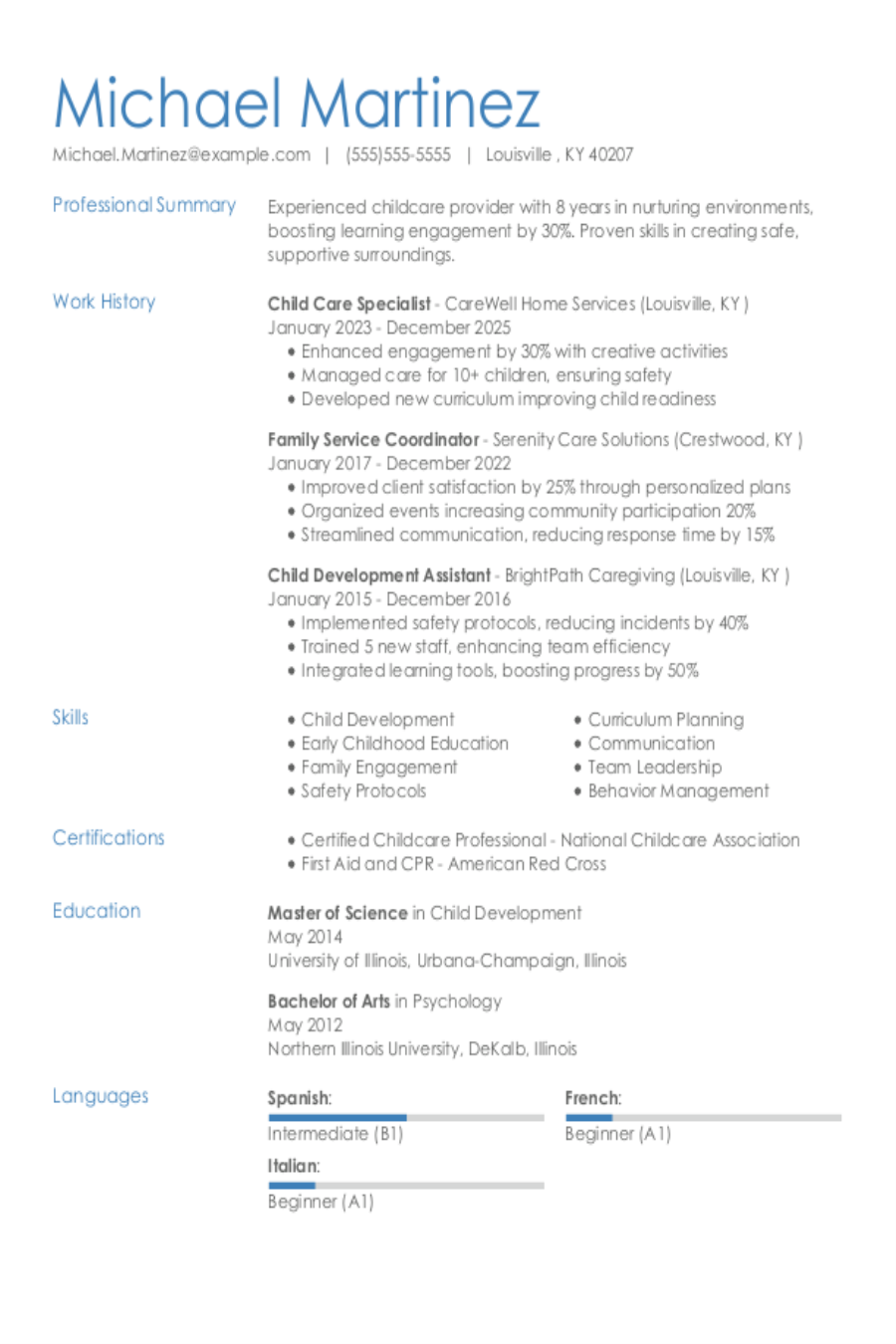A management role means wearing many hats. From mentorship and inspiration to balancing budgets and making tough decisions, employers looking for their next leadership hires will be looking for a resume that showcases a wide variety of critical management skills. Our guide will help you write one.
Our guide provides a complete overview, featuring:
- A working definition of management skills
- Great examples of management skills
- How to add these skills to your resume
- Advice for improving this skill set
- Extra resources for other skill sets
Ready to upgrade your resume for a leadership role? Try out our AI Resume Builder. This tool will help you showcase your management skills while also providing polished resume templates and AI-assisted content based on your input.
What Are Management Skills?
Management skills are the abilities that enable you to organize, guide, and direct a team toward achieving specific goals.
Why are management skills so important? Even if you have no ambitions to become a manager, you’d benefit from understanding this personal skill set and using it in your everyday life. The thing is, management skills speak to your competence in several different ways, from improving team efficiency to resolving conflicts and making strategic decisions.
They’re also relevant in a range of industries, including healthcare, information technology, retail, and many, many more. In fact, every job likely benefits from at least one management skill.
Management skills can be interpersonal skills like leadership, communication, and motivation, or they can be hard skills like project management, financial planning, and resource allocation. Truly, management skills run the gamut.
Next, we’ll go through many more examples that fit the bill.
Top 10 Management Skills: 50+ Examples
Management encompasses a broad range of skill sets. It may be useful to break down these skills into distinct categories to give you a better idea of what counts as a management skill.
Below, you’ll find the top 10 types of management skills along with a handful of examples of each one.
Project management
Project management is a role in and of itself, but it’s also a broader skill set that’s helpful in a wide variety of roles. Here are a few project management skills a manager should have:
- Task delegation
- Scheduling and timeline management
- Resource allocation
- Risk assessment
- Quality control
Communication
Effective communication is the backbone of successful management. It ensures clarity, prevents misunderstandings, and builds strong team dynamics. Here are a few of the key communication skills every manager needs:
- Active listening
- Clear and concise writing
- Persuasive speaking
- Nonverbal communication cues
- Presentation skills
Data analysis
Data plays a role in almost every field, especially in management roles. Managers need to harness data to drive decisions and strategy effectively. Here are essential data analysis skills for managers:
- Statistical analysis
- Data visualization
- Predictive analytics
- Data-driven decision-making
- Understanding data privacy standards
Leadership
This one might seem obvious, but it’s not as common as it should be. Managers—good managers—are also good leaders. It’s a pillar of the role. The examples below will help you understand how this shows up in day-to-day work.
- Inspiring and motivating others
- Ethical judgment and integrity
- Conflict resolution
- Empowerment and delegation
- Visionary thinking
Strategic planning
Strategic planning is crucial for long-term success, helping align the organization’s broader objectives with daily operations. Here are a few of the strategic planning skills vital for managers:
- Goal setting
- Scenario planning
- SWOT analysis
- Resource forecasting
- Market trend evaluation
Change management
Navigating change effectively is a critical skill in today’s rapidly evolving business landscape. Managers need to manage transitions smoothly and keep teams focused. Essential change management skills include:
- Communication of change
- Stakeholder engagement
- Adaptability and flexibility
- Training and development
- Monitoring and evaluation of change implementation
Technology
In our digital age, managers must stay abreast of technological advancements that can optimize workflows and enhance team productivity. Key technology skills for managers are:
- Software proficiency (CRM, ERP, project management tools)
- Remote collaboration technologies
- Cybersecurity basics
- Data management systems
- Technological troubleshooting
Compliance and regulations
Managers must ensure that their teams adhere to industry laws and regulations to avoid legal pitfalls. Here are vital compliance-related management skills:
- Knowledge of legal standards
- Regulatory research
- Compliance reporting
- Implementing compliance protocols
- Training staff on regulations
Financial management
Strong financial acumen allows managers to make informed fiscal decisions, manage budgets, and understand the financial implications of business strategies. Critical financial management skills include:
- Budgeting and forecasting
- Financial reporting
- Cost management
- Financial analysis
- Revenue generation strategies
Team building
Team building is a skill that any all-star manager will have in their toolbelt, essential for fostering a collaborative and motivated workplace. Here are some team-building skills every manager should cultivate:
- Team motivation
- Conflict resolution
- Performance management
- Creating inclusive team environments
- Recognition and rewards systems
Listing Management Skills on Your Resume
Skills are more powerful when you put them to good use, and your resume is the perfect platform.
Here, we’ll run down the simple, three-step way to add managerial skills to your resume.
Look at the job listing closely
It all begins with the job post. Every time you apply for a job, you should follow these instructions.
Read the job post to identify the management skills that matter most to the employer. Copy the job post into a separate document and bold all of the relevant skills.
Here’s what that looks like on an actual job description (management skills are in bold):
- Responsible for team leadership, resource allocation, and project management to meet company goals.
- Utilize strategic planning skills to develop departmental strategies.
- Enhance team productivity through effective communication and motivational techniques.
This will help you customize your resume for each position. It’s also critical for passing through the applicant tracking systems (ATS) that companies use to screen for qualified candidates. They program specific keywords a resume must have, or it’ll end up being rejected automatically.
By looking at the job ad for these keywords and adding them to your resume, you put yourself in the position to sail past the ATS.
Include at least one skills section
Let’s integrate the skills above into a resume skills section.
Here’s an example:
- Team leadership
- Resource allocation
- SEO and SEM techniques
- Project management
- Data analysis and interpretation
- Strategic planning
- CRM software proficiency
You can have multiple skills sections, especially if you are changing industries or are early in your career. The functional resume format focuses more on skills than experience and may be the ideal choice for a candidate with abundant management skills but less relevant experience to discuss.
Bullet points are a great addition to a skills section, making it easier for hiring managers to read and quickly understand your capabilities.
Add skills throughout the rest of your resume
Skills are the lifeblood of your resume. They should flow through every single section, from your experience to your professional summary.
Integrating skills throughout your resume sections will help employers see how you put your management skills to use to achieve results.
How to Improve Your Management Skills
Feel like your management skills need a boost? You’re not alone. Even the greatest managers are always learning, always growing, and looking for opportunities to build on what they know. In fact, continuous learning is one of the marks of a great manager!
Here are some tried and true techniques for developing this skill set:
- Enroll in online courses. Although nothing beats on-the-job experience, you can hone the skills needed to lead effectively and efficiently by taking online courses.
- Attend workshops and seminars. Local business schools often host workshops that can help develop your management capabilities. These are also great networking opportunities.
- Pursue certifications. Certifications can be a great way to both improve your skills and strengthen your resume. Listing management-related certifications on your resume can show employers that you’re developing your expertise and maintaining a growth mindset.
- Seek mentorship. Sometimes the best way to learn is from the people around you who’ve already been through the ringer. Finding a mentor within your organization or industry can provide personalized guidance and insights that are invaluable for your development as a manager.
- Implement feedback systems. Regular feedback from your team can provide insights into your management style and areas for improvement. Maintain an open mindset and encourage your reports to provide detailed feedback on their experience with your management style.
As we come to a close, I’ll share a few additional resources to help you build your skills and send you off with the key takeaways based on this guide.
More Skills Resources
Management skills aren’t the only skills you’ll want to sharpen to create a resume that impresses employers. Check out our other skills guides:
Key Takeaways
Management skills are varied
Managing a team requires proficiency in various skill sets, such as budgeting, project management, change management, data analysis, and more.
Continuous learning is key
Engaging in ongoing education through online courses, workshops, and reading can significantly improve your management skills.
Develop soft skills
While technical skills are important, soft skills like communication, emotional intelligence, and leadership are essential for effective management.
People skills are critical for managers
Constructive feedback from your team can help you identify and refine your management style, and mentors can keep you on the right track.
Embrace technology
Stay updated with the latest technological tools that can aid in effective management, such as project management software and data analysis tools.
Was this information helpful? Let us know!
Don is a Certified Professional Resume Writer (CPRW) with more than 10 years’ experience creating digital content, including four years helping job seekers develop their careers. He holds an M.S. in Journalism from Northwestern University.
More resources

How to Write a Resume: Guide & Examples for 2026
If you re wondering how to write a resume that grabs attenti...

Summary of Qualifications: 13 Examples for Your Resume
Our guide will help you write a summary of qualifications that...

Child Care Resume: Examples & Templates
As a child care professional you need a resume that showcases...

Entertainment Resume: Examples & Templates
As an entertainment professional you need a resume that captu...

Culinary Resume: Examples & Templates
As a culinary professional you need a resume that highlights ...

